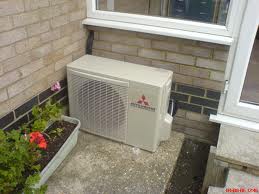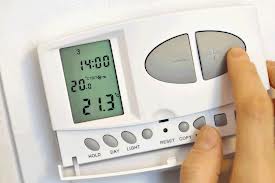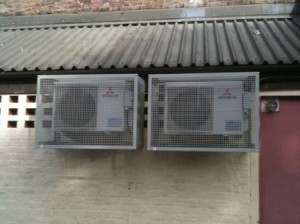
Air Conditioning Indoor units when operated in ‘cooling mode’ create water, this water is collected into an indoor unit drain pan and is then either gravity fed away or pumped away if your indoor unit is leaking water something has gone wrong.
Reason 1 – Bad Installation of Indoor Unit
Is your indoor unit level? If it isn’t then the water could be spilling out of the indoor drain pan before it can be drained away, we have been called out to clients who have leaking indoor units to find the units haven’t been installed correctly by their previous A/c contractor.
Reason 2 – Bad Installation of Gravity Drain Pipe
Does the gravity drain pipe actually have a gravity fall on it? Water won’t flow uphill so if the drain pipe has been installed with an uphill gradient it won’t drain and water will eventually drip out of the indoor unit.
Reason 3 – Blocked Drain Pan / Gravity Drain Pipe
An indoor unit draws air into it from the room, this is through indoor unit filters, filters cant trap 100% of the dust that is in the air & so dust/dirt can find its way into the indoor unit drain pan, if this collects & builds up over time the drain pan or drain pipe can become clogged, if it becomes clogged enough it can restrict water flowing through it enough that water backs up and eventually drips out of the indoor unit.
Reason 4 – Pump Failure
If your system couldn’t have a gravity drain pipe then your contractor would have chosen to install a condensate removal pump, these are specifically designed to pump the water to a suitable outlet, a pump has moving parts thus at some point it can fail, if the pump fails then water will back up and eventually drip out of the indoor unit. Some pumps have filters which require cleaning every 6months (as per pump manufacturer recommendations), if the filter isn’t cleaned then water won’t flow through the filter to the pump mechanism and so can back up and drip out of the indoor unit.
Is Your Outdoor Unit Leaking Water?
It is normal for an outdoor unit to leak water if the indoor unit has been set to heating mode unless the water leaking from the outdoor unit could cause a slip hazard in the form of turning to the ice during the Winter months then this shouldn’t be a cause for worry.
The above tend to be the common reasons as to why an air conditioning indoor unit leaks water, regular servicing of your system in line with manufacturer recommendations will help prevent water leaking from your Air Conditioner, and during a service visit an engineer will use specific chemicals to clean an indoor unit which helps break down any blockages within the drain pipe, they will also check the pump operation to ensure that it is working correctly at the time of the service.


